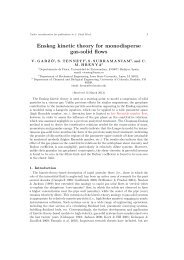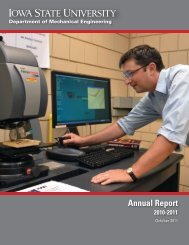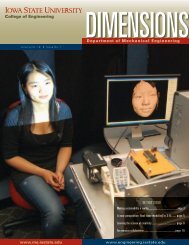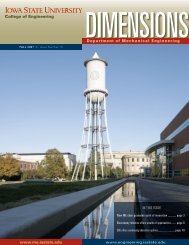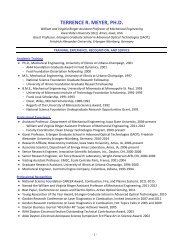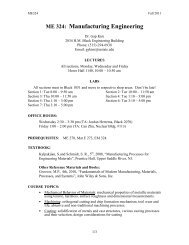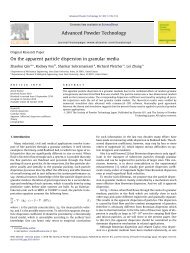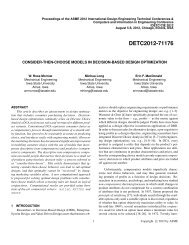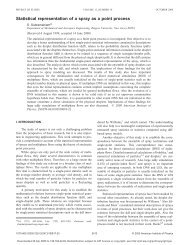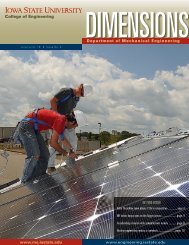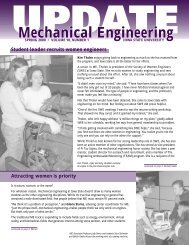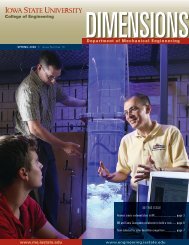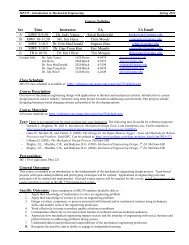Handbook - Mechanical Engineering - Iowa State University
Handbook - Mechanical Engineering - Iowa State University
Handbook - Mechanical Engineering - Iowa State University
You also want an ePaper? Increase the reach of your titles
YUMPU automatically turns print PDFs into web optimized ePapers that Google loves.
The <strong>Mechanical</strong> <strong>Engineering</strong> Curriculum at <strong>Iowa</strong> <strong>State</strong><br />
The mechanical engineering curriculum requires courses in mathematics, chemistry, physics, English,<br />
engineering, and general education area. All accredited engineering programs in the country require<br />
approximately the same amount of basic science, mathematics, engineering sciences and humanities<br />
credits. These minimum guidelines are established by our engineering accreditation agency (ABET).<br />
ACCREDITATION BOARD FOR ENGINEERING AND TECHNOLOGY<br />
(ABET)<br />
The Accreditation Board for <strong>Engineering</strong> and Technology (ABET) is primarily responsible for monitoring,<br />
evaluating, and certifying the quality of engineering, engineering technology, and engineering-related<br />
education in colleges and universities in the United <strong>State</strong>s. ABET develops accreditation policies and<br />
criteria and conducts comprehensive evaluations of degree programs. Programs that meet the prescribed<br />
criteria are granted accredited status.<br />
ABET is responsible for establishing standards, procedures, and an environment that encourage high<br />
quality engineering, engineering technology, and engineering-related education the accreditation process<br />
ensures that each graduate possesses the skills necessary for lifelong learning and productive<br />
contribution to society, the economy, employers, and the profession. The mechanical engineering<br />
program at <strong>Iowa</strong> <strong>State</strong> <strong>University</strong> is an ABET accredited program.<br />
Objectives<br />
To serve the public, industry, and the profession in general by stimulating the development of improved<br />
engineering education; including encouraging curricular improvement in existing programs and helping<br />
develop educational models for the establishing of new programs.<br />
To identify for prospective students, student counselors, parents, potential employers, public bodies and<br />
officials, the engineering, engineering technology, and engineering-related programs that meet the ABET<br />
criteria for accreditation.<br />
A Quality Profession<br />
A degree from an ABET-accredited program is a quality profession. Graduates from ABET-accredited<br />
programs have a high degree of job mobility because the wide recognition of the accreditation system in<br />
the world engineering community.<br />
The faculty and staff of the <strong>Mechanical</strong> <strong>Engineering</strong> Department at <strong>Iowa</strong> <strong>State</strong> <strong>University</strong> have worked<br />
diligently with students, alumni, and employers to create an outstanding program for development of<br />
skilled, productive engineers. Graduates are well-qualified to embark on successful industrial careers or<br />
to pursue advanced study in graduate or professional schools. This work began in the fall of 1996 and<br />
represents the most comprehensive evaluation and renewal of the mechanical engineering curriculum in<br />
over twenty-five years.<br />
The <strong>Mechanical</strong> <strong>Engineering</strong> Curriculum Committee first developed a goal statement to guide its work:<br />
―In light of the accelerating pace of change in the engineering profession, we plan to review our<br />
entire curriculum and develop the best possible educational experience for our mechanical<br />
engineering students to provide them with a sound foundation for a successful career.‖<br />
2009 Kiewit Undergraduate Student Services Center<br />
3



